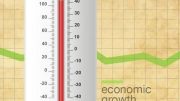
New research suggests the global economy in the 21st century will grow slower than anticipated, impacting our ability to adapt to climate change. The study emphasizes the need for wealthier nations to financially support lower-income countries in climate adaptation.
A recent study led by CU Boulder indicates that in order successfully adapt to climate change, nations must collaborate financially.
A recent study forecasts that the global economy will experience slower growth in the 21st century than previously anticipated by economists. This revelation holds significant implications for our capability to address climate change in the forthcoming years.
The research, which was recently published in the journal Communications Earth & Environment, outlines projections for the economic trajectories of four income brackets of nations over the upcoming century. The findings indicate that not only will growth rates be more subdued than once thought, but also that developing nations might face extended timelines in bridging the wealth disparity with their affluent counterparts. What was once envisioned as the bleakest outlook for worldwide economic expansion might indeed represent an optimistic scenario according to the study.
The findings suggest governments need to start planning for slower growth and wealthier countries may need to help lower-income nations finance climate change adaptations in the coming decades, according to the study authors.
“We’re at a point where we maybe need to significantly increase financing for [climate] adaptation in developing countries, and we’re also at a point where we might be overestimating our future ability to provide that financing under the current fiscal paradigm,” said Matt Burgess, a CIRES fellow, director of the Center for Social and Environmental Futures, and assistant professor of environmental studies at CU Boulder who led the new study.
“We can now start to winnow down the range of possibilities and move forward in more tangible ways,” said Ryan Langendorf, a postdoctoral scholar at CU Boulder and co-author of the new study.
In the new study, Burgess and his colleagues used two economic models to project how much the global economy will grow over the next century and how quickly developing countries will approach the income levels of wealthier nations.
Both models found the global economy will continue to grow, but that growth will be slower than most economists expected and there will be a larger income gap between wealthier and poorer nations. This means richer countries may need to help finance climate adaptations for poorer countries, and debt-ceiling crises, like what the United States experienced this spring, may become more common.
“Slower growth than we think means higher deficits than we expect, all else equal,” Burgess said. “That means debt would likely become more contentious and important over time, and could mean more frequent debt-ceiling fights.”
Similar to a flight emergency, where individuals should put their own oxygen masks on first, wealthier nations should focus on getting their own financial houses in order so they can be in a position to support lower-income nations in financing climate adaptations, according to the researchers.
“We’re talking about relatively less growth, relatively more inequality, but we’re still talking about a world that is richer than today and more equal across countries than today’s world,” Burgess said.
Still, many wealthy nations are accustomed to growing their way out of debt, but that may not be possible under the new scenario, according to Ashley Dancer, a graduate student at CU Boulder and co-author of the study.
“The next question is: what are some ways that we should be or could be helping [lower-income countries] adapt, if the expectation is that they’re not going to meet the level of wealth that would allow them to do that quickly and aggressively?” Dancer said.
Reference: “Multidecadal dynamics project slow 21st-century economic growth and income convergence” by Matthew G. Burgess, Ryan E. Langendorf, Jonathan D. Moyer, Ashley Dancer, Barry B. Hughes and David Tilman, 22 June 2023, Communications Earth & Environment.
DOI: 10.1038/s43247-023-00874-7









“Limits to Growth”.
That was the name of a book that came out in (checks notes) 1972.
It was based on the Malthusian doctrine of unrestrained exponential growth from (checks notes) 1798.
It may be better for researchers to examine how this growth happens anyway, and what conditions really cause catastrophes of human rights destruction or human life destruction.